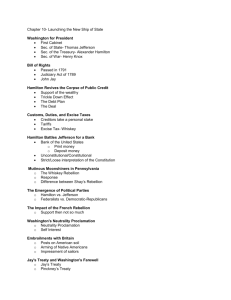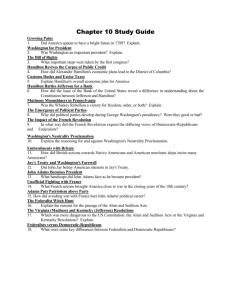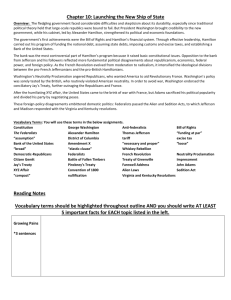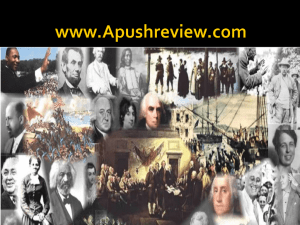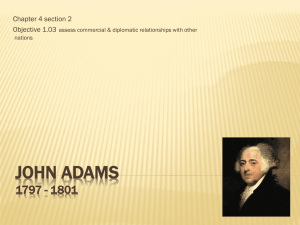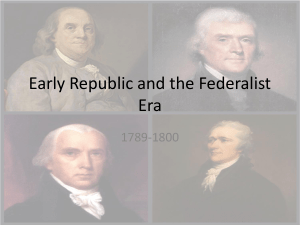Launching the New Government
advertisement
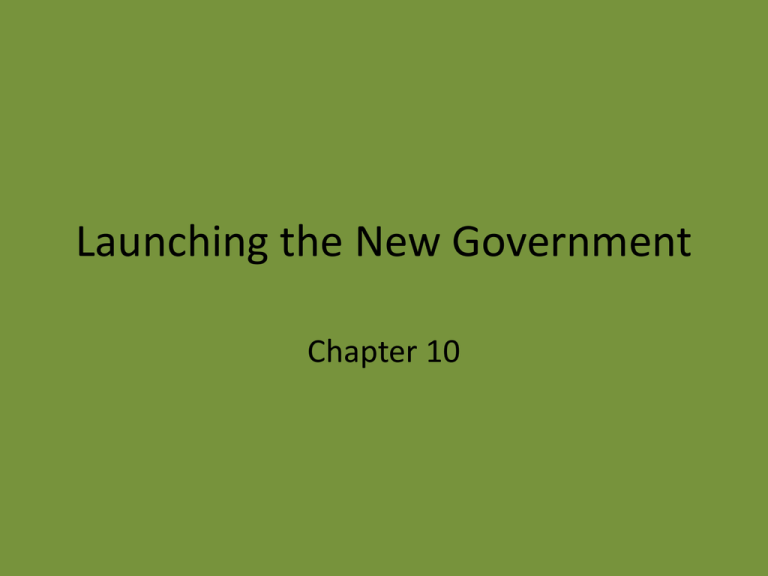
Launching the New Government Chapter 10 The United States in 1789 • Fast population growth (doubling every 25 years) – Census: (1790) 4 Million people • 90% of population rural – Big cities: Philadelphia, New York, Boston, Charleston, Baltimore • 95% lived east of Appalachians – Western states: Kentucky, Tennessee, Ohio Establishing the Presidency • George Washington elected in 1789 – Unanimously elected – Takes oath of office April 30, 1789 – New capital: New York City • Cabinet: heads of executive branch departments – Secretary of State: Thomas Jefferson – Secretary of Treasury: Alexander Hamilton – Secretary of War: Henry Knox Judiciary Act of 1789 • Congress organizes the Federal Court System – The Supreme Court – District and Circuit Courts – Attorney General • The Supreme Court: – Chief Justice: John Jay – 5 Associate Justices Hamilton’s Economic Plan • Alexander Hamilton: Secretary of the Treasury • Wanted fiscal policies that favored the wealthy – “trickle down” • Plan for the nation’s economy: – Bolster credit – Raise revenue through duties and excise taxes – Create a Bank of the United States Establishing Credit • Establish Credit – Public confidence needed to secure funds – Fund national debt ($54 M) “at par” (pay off debt plus interest) – Assumption: national government would assume state debts ($21.5 M) • Debt heavy states (Mass) • Small debt states (VA) • Uses placement of national capital to persuade southern states (D.C. along Potomac in South) – National Debt = cohesiveness Creating Revenue • Revenue needed to pay for interest on debt • Tariffs: – Depended on foreign trade – Tariff of 1789: Tariff = 8% of the value of import – Also meant to protect American industry • Excise Tax: – Tax on domestic items – Main excise tax: Whiskey Whiskey Rebellion • 1794: SW Pennsylvania • 1st challenge to the new government • Problem: pioneer farmers view the excise tax on whiskey as a burden on their economy – “Liberty and No Excise” – Tar and feather revenue officers – Stop excise collections • Washington forms an army and marches to Pennsylvania, easily puts down rebellion • Importance: New government has FORCE Bank of the United States • Government would be major stockholder • Purpose: – Strongbox for funds – Stimulate business by circulating money – Print sound and stable national currency • Bank created in 1791 – Capital of $10 M(1/5 owned by the government) – Located in Philadelphia – Chartered for 20 years Debate over the Bank • Debate: Is it constitutional? – Jefferson says “No” • Nothing in the Constitution allows for it – Hamilton says “Yes” • Constitution does not forbid it • Necessary and Proper Clause of the Constitution • Views on the Constitution: – Strict vs. Loose Construction Formation of Political Parties • Reasons political parties formed: – Opposition to Hamilton’s plan – Views on interpretation of the Constitution • Jefferson vs. Hamilton (Strict vs. Loose) • Political parties previously unknown • Political parties go against the idea of national unity due to the idea of opposition • Beginnings of the two party system – Federalists (Hamilton) – Democratic-Republicans (Jeffersonians) • Actually serves an important role in democracy, since the party out of power keeps politics from drifting away from the needs of the people Remaining Neutral • Americans watch the French Revolution with interest. – Different political parties support the various phases • The British are drawn into the French Revolution • Problem: Who to support – Franco-American Alliance (1778) was supposed to be “forever” – Jeffersonians: want to honor alliance with French – Federalists: Pro British • George Washington wants to avoid war at all costs – Reason: military is weak, economy is not strong, still not politically united Neutrality • Neutrality Proclamation of 1793: – – – – The U.S. would remain neutral Encourages citizens to remain impartial Helps establish an isolationist position Controversial • Edmond Genet: French representative – Thought the Neutrality Proclamation did not represent the true wishes of the American people. – Starts activity that was not authorized by the French alliance • Recruits armies to invade Spanish Florida and Louisiana • Threatens to take appeals for support to the American voters, Washington demands he leave Trouble with the British • For 10 years the British have kept forts on American soil, violating the Treaty of 1783 • Reasons: – British don’t want to give up fur trade – Want to build Indian buffer state • Sell firearms and alcohol to Miami confederacy • View the Ohio River as the border between the U.S. and their confederacy • 1790-1791: Chief Little Turtle defeats hundreds of American soldiers • Battle of Fallen Timbers: 1794 – – – – General Anthony Wayne routes the Miamis British refuse to shelter the fleeing Indians Indians offer Wayne the peace pipe Treaty of Greenville (1795): Indians give up land in Old Northwest (Indiana and Ohio) • Get $20,000 and annual annuity of $9,000 • Right to hunt the land • British seize 300 American merchant ships in the French West Indies – Force American sailors into service on British vessels (impressment) put others in prison – Jeffersonians call for war, Federalists want to avoid drastic measures Treaties with Britain and Spain • Jay’s Treaty: (1794) – In effort to avoid war, Washington sends John Jay to London to negotiate • Jay is a Federalist, Jeffersonians fear he will sell out – Jay wins few concessions • British promise to evacuate forts • Britain would pay for damages from recent seizure of ships, but made no future promises • U.S. would pay remaining war debts – Jeffersonians are angry about the treaty • Farmers (Jeffersonians) have to repay debt, Merchants (Federalists) get paid for damages • Pinckney’s Treaty: (1795) – Spain is fearful of an Anglo-American alliance so they give the U.S. what they want • Free navigation of the Mississippi River • Give up disputed land north of Florida Washington Retires • Retires after 2 terms – Establishes the 2 term precedent • Farewell Address: – Printed in newspapers – Advises against long term alliances – Encourages Americans to avoid the divisions of political parties • Washington’s Contributions: – Central government solidly established – Kept the nation out of foreign wars and involvement • Leaves office in 1797 Election of 1796 • John Adams (F) vs. Thomas Jefferson (D-R) – Leads to political bickering between the two parties • Outcome: – Adams: 71 Electoral Votes (President) – Jefferson: 68 Electoral Votes (Vice President) • John Adams: – 62 years old – Stern principles, stubborn devotion – Intellectual aristocrat, no real appeal to the masses – Citizens view him with “respectful irritation” – Has to fill Washington’s shoes – Hated by Hamilton – Adams inherits a potentially violent quarrel with France Fighting with France • France is upset about Jay’s Treaty, see it as violation of the Franco-American Treaty of 1778 • French Response: – French warships begin seizing American merchant vessels (about 300) – Refuse to receive America’s envoy to Paris • Adams sends diplomatic commission of 3 men to Paris, hope to meet Talleyrand (foreign minister) • XYZ Affair: American envoy met by three go-betweens (X,Y, &Z) who ask for a loan (bribe) of $250,000 just to meet with Talleyrand. – Envoy refuses the bribe just to talk – Americans call for war – Navy and Marine Corps created, army of 10,000 authorized • Undeclared War: (1798-1800) Navy captures over 80 French ships, several hundred American ships lost Avoiding War • Talleyrand realizes fighting the U.S. will only cause the French more enemies. • Says that if Adams sends a new minister to France they would be received with proper respect. • 1799: Adams sends a new minister to France – Upsets the war hawk Federalists – Dem-Rep. are happy war is avoided • Convention of 1800: – Napoleon Bonaparte wants to end trouble with the U.S. – Agrees to end the 22 year old treaty of alliance – U.S. would pay the damage claims of Americans shippers • John Adams lasting legacy: avoided war with France Alien and Sedition Acts • 1798: Federalists pass a series of laws to reduce the power and influence of the Jeffersonians • Alien Acts: – “Aliens” European immigrants who were usually pro Jeffersonian – Raise residency requirements for aliens from 5 years to 14 years – President could deport or imprison dangerous foreigners • Sedition Acts: – Attacks on freedom of speech and press – Those who impede the policies of the government or defamed officials could be imprisoned or heavily fined – Violates the 1st amendment, but Federalist S.C. doesn’t want to rule it unconstitutional Virginia and Kentucky Resolutions • Jeffersonians vow to fight the Alien and Sedition acts (fear loss of constitutional rights) • Jefferson (Kentucky) and Madison (VA) write a secret series of resolutions in 1798-1799 which are adopted by the legislatures of those states. – Compact Theory: states had made a compact/contract in creating the government, making the states the final judge – Nullification: states can refuse to accept the laws • These ideas are never fully accepted or used by the states Federalist vs. Democratic Republicans • Divisions between the two parties grow as the nations approaches the election of 1800
